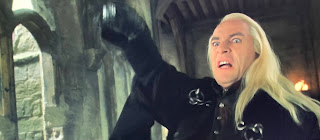 |
| The Chamber -- film and novel |
It's a nice moment... but, in the context of the entire series of novels, it makes no sense.
As we learn in later novels, Hogwarts puts students through two sets of incredibly important examinations (OWLs and NEWTs) at specific points in their academic journeys (after fifth and seventh years). Each has a distinct impact on the student's academic and professional careers and we see the hero trio agonize over their OWLs in The Order of the Phoenix. In fact, Harry, Hermione and Ron's experience in book five suggests that students begin preparing for their major exams very early in the academic year (and often the year before). The exams are important enough, and tough enough, that students need to work long and hard to prepare for them.
So there is virtually no chance that year-end exams for all students would be cancelled for any reason. Sure, it might be possible for the school to cancel exams for students in their first, second, third, fourth and sixth years but it is inconceivable that OWL and NEWT examinations would be cancelled in any year. From what we learn in later novels, the students would have to sit these exams at some point. So I think it is clear that the students who have been working so hard and so long to prepare for them would revolt against the thought that they would be postponed for any period of time.
I first noticed this issue when I recently re-watched the film version of the story. And I immediately blamed screen writer Stephen Kloves. In having Dumbledore announce the cancellation at the year-end speech, I thought Kloves was, of his own volition, taking things a step too far.
Then I checked Rowling's original novel and found this: "or Professor McGonagall standing up to tell them all that exams had been cancelled as a school treat".
So I was wrong to blame Kloves (Sorry, Stephen).
But it does raise questions about how detailed J.K. Rowling's planning was when she wrote the second novel around 1998, a subject that, as a wannabe writer who finds Rowling's accomplishment in creating the Wizarding World absolutely amazing, is of significant interest to me.
It seems clear to me that, at the point that she was writing The Chamber of Secrets, Rowling had not yet developed in detail the academic journey students go on when they attend Hogwarts. The inclusion of the cancellation of year-end exams for all students in the second book is evidence that, in 1998, the concept of the OWLs and NEWTs was still to be created.
I am not saying this is a big deal. The seven novels are remarkably consistent and it is clear that, even if Rowling in 1998 had not yet developed details to the level of year-end exams, the author accomplished something remarkable in inventing such an incredibly detailed world as she went through the process of writing the seven novels.
But it is interesting to me and indicative of how difficult it can be to do what Rowling did so well -- plan a complex world and then write it over the course of a decade. I don't think it's possible to get every detail right in the early novels when the process of writing the later novels requires thousands of decisions, thousands of details, thousands of considerations as to what will make each book dramatic and effective.
That being said, I am going to read into ending of The Chamber of Secrets that only some exams were cancelled and that students facing their OWLs and their NEWTs were still required to sit their examinations.

